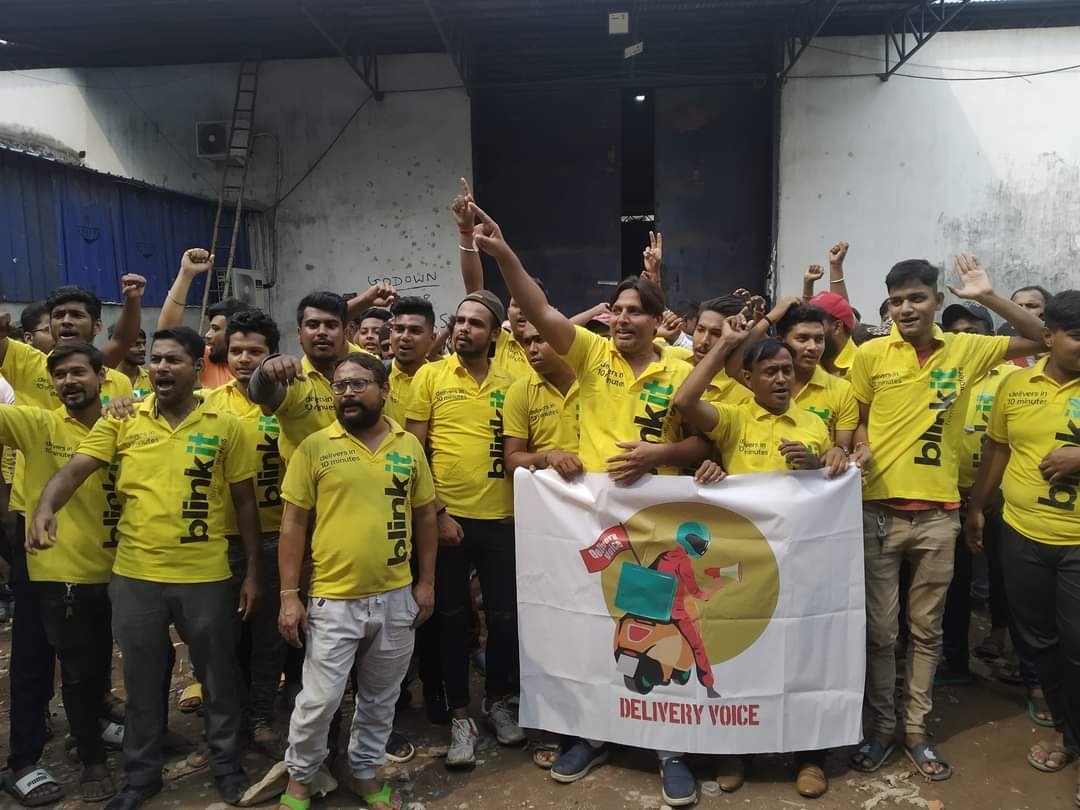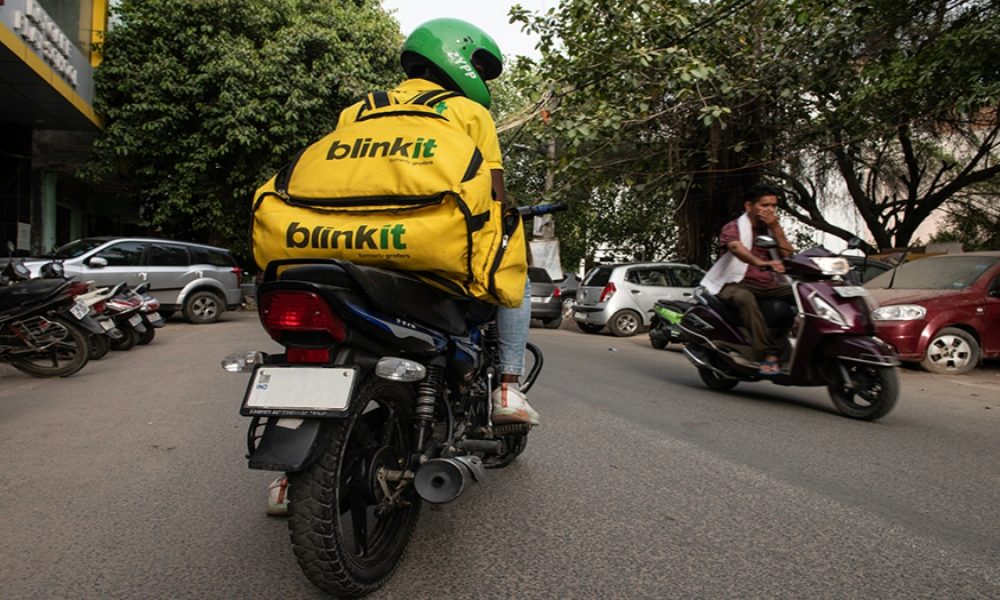More Than 100 Blinkit Dark Outlets In Delhi NCR Are Closed Due To A Delivery Employees’ Strike.
Protests by delivery executives of Blinkit in cities including Delhi, Mumbai, Bengaluru, and Chennai erupted last year after Zomato's main rival, Swiggy implemented a revamped wage structure.

Over half of the Zomato-owned rapid commerce platform, Blinkit’s 200 dark storefronts across Delhi, Gurugram, Faridabad, Ghaziabad, Noida, and Greater Noida have been closed for the past three days, with a more significant number set to be offline in the coming days owing to delivery worker strikes. Delivery executives oppose a change in their compensation system, which they allege will result in lower profits. As per a source familiar with the case, almost all of Gurugram’s 50-60 outlets have closed, and more are closing across Noida and Delhi as the new charge structure is implemented.
Furthermore, consumers across the region have been unable to make orders in offline stores, with the Blinkit app displaying these locations as “temporarily unavailable” due to store maintenance. Several people have taken to social media to voice their concerns. A search on the Blinkit app at most Gurugram retailers and several others in Delhi, Noida, Faridabad, and Ghaziabad revealed they were unavailable. Certain stores in South Delhi and other locations in Noida offered 8-10 minute delivery. It has been learned that while delivery executives throughout the Delhi-National Capital Region plan to continue protesting in the coming days, the firm intends to roll out the new compensation structure to other locations.

The company anticipated disruption before the new structure’s Monday rollout but is attempting to educate delivery executives about the benefits. Blinkit executives have been on the pitch speaking with protesting employees, a corporate executive said. According to reports, Blinkit has 400 dark businesses nationwide in 20 cities, with half in Delhi-NCR. Blinkit recorded an average gross order value/ dark store/ day of Rs 5.24 lakh during the October-December 2022 quarter, up from Rs 4.22 lakh in the July-September 2022 period. Blinkit reported a GOV of Rs 1,749 crore for the December quarter, while sales were Rs 301 crore.
An email question submitted to Zomato received no answer. A Blinkit spokesman, however, stated that the company considered this as a step in the right direction for our ecosystem of partners since it is just for both them and our clients.
Several delivery folks said they signed up with Blinkit last year when the charge was Rs 50 per order, but it was dropped to Rs 25 last year, and it has now been reduced further to Rs 15 with the introduction of a distance-based fee component.

Blinkit dark shops operate within a 2-3 km radius, and delivery executives voiced worry that their revenues will be constrained due to the new structure’s distance-based component.
Rider service radius may grow in areas where the number of the company’s dark establishments is lower. Zomato’s chief financial officer Akshant Goyal stated in the business’s December-quarter results announcement on February 9 that the company hoped to increase Blinkit’s dark shop count by 30-40% over the following year. However, according to a business official, delivery executives are likely to earn more from the improved compensation structure as Blinkit adds additional client use cases to the app. They are adding more items and use-cases to encourage customers to order from Blinkit on a regular basis. As a result, the riders will be able to deliver more orders in a day, the individual explained.

Some experiences directly from ground level.
A number of Blinkit delivery executives in the Delhi-NCR region said that they joined Blinkit because it paid more than other platforms that onboard delivery professionals. Many fresher riders are still joining up for lesser rates, but some of us have been delivering for the firm for more than a year because it pays greater rates than Swiggy, Zomato, Dunzo, and Zepto, according to 33-year-old Jeetu Yadav, who delivers for a Blinkit store in Gurugram.
Unlike food-delivery platforms, rapid commerce firms such as Blinkit and Zepto have dedicated delivery executives who are assigned to individual establishments. This is done to guarantee that personnel are always accessible to complete requests in a timely manner.
According to Rahul Gupta, a store manager at a Delhi-based dark store, the company’s owner has requested that the shutters remain down due to the demonstrations. It is pointless to keep the store open if deliveries are not being made. If the store remains open and orders continue to come in, we may be punished by the firm for failing to fulfil them. As a result, Gupta believes it is best to keep the business closed until the delivery executives return.
The shop management has assured them that the new compensation structure will result in increased revenues as the dark store serves a bigger region and delivery distances rise, but in their experience, orders that are more than 2 km long are quite rare.
According to Mohammed Zakir, one of the protesting Blinkit delivery partners who works from an east Delhi store, “there are nearly 80 delivery executives tied up with this store, and with all of them on duty, they might not cross the minimum Rs 15 per delivery mark.” The delivery executives, according to Zakir, wanted to return to work, but not at the decreased pay structure. They want to deliver for Blinkit, but the charge decrease is insufficient. They are hopeful that the corporation would return to the former arrangement and refrain from reducing compensation. “There are still delivery boys working in stores where the new system has not been implemented,” he explained.
Ganesh Kumar, a 28-year-old delivery partner from Noida, also complained about terrible working conditions at his store. He has been delivering for Blinkit for the last six months. Despite paying Rs 1,600-1,700 as an onboarding charge, drivers who joined up at this store after August have yet to get a bag or a raincoat from the firm, he claimed. Kumar further stated that he often works 13-14 hours daily, between 30-40 deliveries. With incentives, this amounted to around Rs 1,500-1,600 per day (under the previous compensation system).
The daily petrol cost is Rs 300, while the daily meal cost is Rs 100-150. They also lose roughly 10% of their revenue on cash-on-delivery purchases. He said the increased distribution would reduce earnings by Rs 250-300, resulting in even fewer savings.
According to Kumar, Blinkit only permits delivery executives to store up to Rs 500 for cash on delivery orders. Once you have Rs 500, transfer it to Blinkit via the app. They don’t always have enough money in our bank accounts to do it, so we must deposit it first. They can’t keep going to the bank, so they send the cash to a business owner near our store, who performs an internet transfer into our accounts. He stated that the store owner would charge us Rs 10 for every Rs 100 they got in our accounts.
Disclosure.
Protests by delivery executives in cities including Delhi, Mumbai, Bengaluru, and Chennai erupted last year after Zomato’s main rival, Swiggy implemented a revamped wage structure. Delivery executives were also requesting the removal of the new rate scheme at the time. It has previously been reported that Swiggy had faced delivery worker strikes throughout metro areas amid talks over the industry’s low pay and absence of a social safety net. Let’s see whether the demands of delivery executives at our services at every minute would make their needs accepted by the management!




